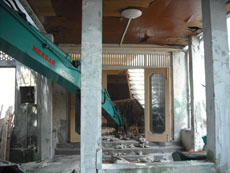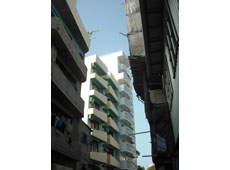A fool and his valuables are soon parted.
The general understanding of this adage is, of course, that a fool cannot truly appreciate the value of his prized possessions, and is easily swindled out of it.
Truer words have not been spoken, as evidenced in this article originally published on the website of a local NGO that calls itself the ‘Islamic Foundation of the Maldives’.
The article, titled ‘The Evils of Democracy’, is clearly inspired by the neo-conservative school of debate that absolves the writer from furnishing any intellectually honest evidence to support his claims, as long as he makes a decidedly passionate attack against a straw-man caricature – in this case, the Islamist’s skewed perception of democracy.
The post is riddled with such vacuous assertions as ‘Democracy is a system of infidelity..’ and ‘…openly hostile to the faith of monotheism’, but provides very little by means of actual evidence to justify these bizarre, sweeping statements.
It would be easy to dismiss the unfortunate article as mere farcical comedy, if it weren’t so highly irresponsible and dangerous.
As clueless as this NGO appears to be about the concept of democracy, there are actually ordinary, simple-minded folk who form judgments based solely upon information derived from such dubious and disreputable sources.
The author of the article betrays no evidence of an ability to distinguish between democracy, hedonism, capitalism and anarchy – all of which have been conveniently bracketed together as ‘evil democracy’. Nor does he suggest any alternatives to his rather bleak, dystopian portrayal of democracy.
The article mentions that, in democracies, the functions of the state are divided among three separate powers, but fails to mention why this is a bad thing.
As expected, it also criticises the existence of an opposition, and the din, commotion and confrontation this ensues. What it fails to mention is that this ‘noise’ is actually the sound of openly expressed opinions, and a public that actively participates in its own governance.
The often cacophonous noise of energetic democratic debate is much more soothing to the ear than the defeated, graveyard silence that pervades present day theocracies.
Democracy is definitely not a fool-proof system – nor is any other system, for that matter. That is because humans are flawed beings. We are all susceptible to greed, corruption and avarice.
But that is precisely why democracy is the best system we have today. Democracy has inherent checks and balances, and pays obeisance to concepts like Human Rights, accountability, public mandates and universal franchises on which the system is erected.
The tendency towards theocracy among neo-conservatives is baffling.
Would this NGO rather prefer the alternative, where every flood, famine and pestilence is conveniently pinned by authorities on the common man’s sins?
Would they rather Dhivehin lived under a system where the failures of an incompetent ruling clergy – the illiteracy, starvation and poverty that have become hallmarks of such societies – are routinely blamed on the common man’s defiance of God and lack of ideological purity?
When apologists for clergy-rule claim that democracy is an example of Human Law superseding ‘Divine Law’, will they also kindly point out to us a single example of a modern theocracy that is not a clear-cut case of a small group of humans dictating their ruthless will on others – only, this time with no accountability or room for redress?
It is an absolutely fatuous claim that clergy-controlled human-rights disasters like Saudi Arabia or Iran are somehow more sparkling examples of Islamic values than a democratic state like the Maldives.
The Maldives could have meekly followed the pied piper’s malevolent tunes, established a theocracy, and joined the league of failed states. Instead, Dhivehin have chosen to empower themselves with a modern democracy – of its own free will, without any foreign coercion.
The Muslims in this country, like the vast majority of Muslims around the world, have chosen a democratic system for the simple reason that IT WORKS. It has given its people a voice. It has prevented tyrants from abusing their authority with impunity. It has made their governments accountable to them.
The article finally comes to a head with a tired, worn-out, Chicken Little narrative about how democracy is a ‘conspiracy’ of the (entirely imaginary-) “diabolical forces of Jews and Christians” that, for unspecified reasons, have been compulsively harassing our fundamentalist friends since the dawn of time.
Even if we were to buy for a moment, for this NGO’s benefit, that democracy is a sinister plot devised by medieval Europeans (presumably in collaboration with ancient Greeks) to ‘divide’ and destabilise future Islamic societies they couldn’t possibly have foreseen, it is still a highly facetious remark.
For one thing, isn’t it rather absurd that the alleged diabolical agents of Judaism and Christianity have chosen to implement this ‘evil democracy’ thing in their own homelands – with much success to boot?
Modern democracies leave the clergy-states and dictatorships of the world biting the dust on every single human development index.
Today, the democratic Europeans and Americans are able to clothe and feed their people. Their elected governments have lifted millions out of poverty and starvation, and given them jobs and opportunities. They have the best health care systems in the world, the best schools, the top universities and made unparalleled scientific and cultural advances.
Far from being divided into tiny, squabbling factions, countries that were killing and bombing each other just a few decades ago, have opened up their borders to allow their people to travel and mingle freely.
Despite the diversity of their languages and cultures, their societies have stabilised enough to come together and form a common Parliament, implement a common currency, and adopt a common flag.
A spectacularly failed ‘plot to divide people’, by any measure.
Given this reality, the factions that continue to advocate a system where a limited group of people is allowed to oppress everyone else on the grounds of ideology can only be taken for those who seek to occupy the plush seats of authoritarian power. One suspects this is also the case for some of our own homegrown organisations.
May the Maldives beat back these retrograde forces, and continue to uphold the proud democratic freedoms that they have earned through sheer perseverance and sacrifices.
In the best democratic spirit, we must make Dhivehi Raajje a scintillating example of peace, democracy and harmony that so many other Muslim nations have failed to achieve.
Or else we’d end up like the fabled fool, too dense to appreciate the true worth of our invaluable freedoms, and caged once again in the all-too-familiar dark mental prisons of fear.

